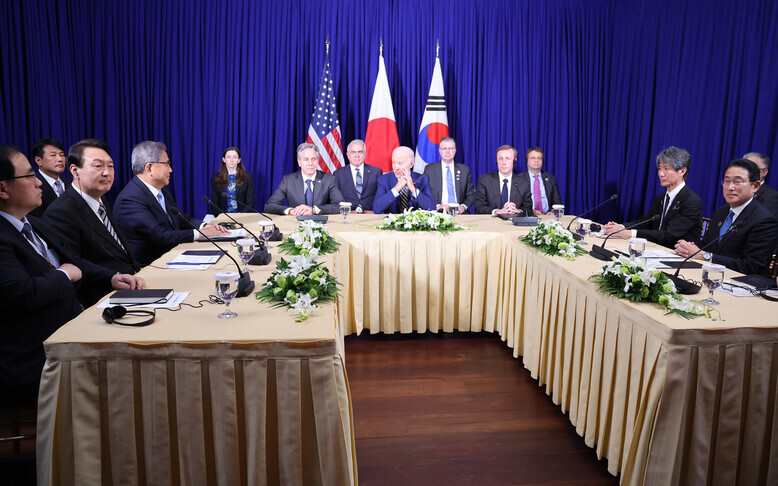hankyoreh
Links to other country sites 다른 나라 사이트 링크
China warns closer ties between Seoul, Washington, Tokyo raise regional tensions

On Sunday, one day before the scheduled US-China summit, Chinese state media criticized the joint statement put out by South Korea, the US, and Japan following their trilateral summit for escalating regional tensions.
In particular, with Seoul, Washington and Tokyo coming together and mentioning “peace and stability in the Taiwan Strait,” which is viewed by China as an issue of core national interest to be protected by force if necessary, intense friction with China is likely to come.
Regarding the adoption of the “Phnom Penh Statement on Trilateral Partnership for the Indo-Pacific” by the three countries on Sunday, China’s Global Times stated that “while the US has stepped up efforts in aligning its allies to serve its own strategic purposes, it will only escalate tensions on the Korean Peninsula.”
Lü Chao, an expert on the Korean Peninsula at the Liaoning Academy of Social Sciences, told the Global Times that the US is “using the excuse of the North Korea nuclear issue to advance military cooperation between South Korea and Japan and realize the US plan for an 'Asian NATO’.”
According to the expert, "The true intention is advancing military cooperation to contain China in the region.”
In other words, although South Korea, the US, and Japan cite the North Korean threat as the main reason for their military cooperation, China sees itself as the ultimate target.
In fact, after first mentioning peace and stability in the Taiwan Strait in the US-Japan summit statement in April last year, Japan is now stepping up efforts to strengthen its military capabilities, calling an “emergency situation in Taiwan an emergency situation for Japan.”
With South Korea now jumping on the bandwagon of the US and Japan with the statement in Phnom Penh, it has taken on the burden of having to work with Washington and Tokyo in the event of a crisis in Taiwan.
In China, however, experts point to large differences between the South Korean and Japanese positions.
Yang Xiyu, a senior research fellow at the China Institute of International Studies, told the Global Times that unlike Japan, which actively aligns itself with Washington's strategic goals in pursuit of its goal of checking China, South Korea is “more focused on how to safeguard peace and stability on the Korean Peninsula.”
Yang added that South Korea “has to cooperate with China more closely economically, and the role of China is particularly important in the North Korea issue.”
However, this latest joint statement has made it clear that South Korea is determined to stand on the same side as the US-Japan alliance.
By Choi Hyun-june, Beijing correspondent
Please direct questions or comments to [english@hani.co.kr]

Editorial・opinion
![[Column] Season 2 of special prosecutor probe may be coming to Korea soon [Column] Season 2 of special prosecutor probe may be coming to Korea soon](https://flexible.img.hani.co.kr/flexible/normal/500/300/imgdb/original/2024/0426/3317141030699447.jpg) [Column] Season 2 of special prosecutor probe may be coming to Korea soon
[Column] Season 2 of special prosecutor probe may be coming to Korea soon![[Column] Park Geun-hye déjà vu in Yoon Suk-yeol [Column] Park Geun-hye déjà vu in Yoon Suk-yeol](https://flexible.img.hani.co.kr/flexible/normal/500/300/imgdb/original/2024/0424/651713945113788.jpg) [Column] Park Geun-hye déjà vu in Yoon Suk-yeol
[Column] Park Geun-hye déjà vu in Yoon Suk-yeol- [Editorial] New weight of N. Korea’s nuclear threats makes dialogue all the more urgent
- [Guest essay] The real reason Korea’s new right wants to dub Rhee a founding father
- [Column] ‘Choson’: Is it time we start referring to N. Korea in its own terms?
- [Editorial] Japan’s rewriting of history with Korea has gone too far
- [Column] The president’s questionable capacity for dialogue
- [Column] Are chaebol firms just pizza pies for families to divvy up as they please?
- [Column] Has Korea, too, crossed the Rubicon on China?
- [Correspondent’s column] In Japan’s alliance with US, echoes of its past alliances with UK
Most viewed articles
- 1‘We must say no’: Seoul defense chief on Korean, USFK involvement in hypothetical Taiwan crisis
- 2Why Kim Jong-un is scrapping the term ‘Day of the Sun’ and toning down fanfare for predecessors
- 3Two factors that’ll decide if Korea’s economy keeps on its upward trend
- 4BTS says it wants to continue to “speak out against anti-Asian hate”
- 5After election rout, Yoon’s left with 3 choices for dealing with the opposition
- 6Gangnam murderer says he killed “because women have always ignored me”
- 7South Korea officially an aged society just 17 years after becoming aging society
- 8AI is catching up with humans at a ‘shocking’ rate
- 9Ethnic Koreans in Japan's Utoro village wait for Seoul's help
- 1046% of cases of violence against women in Korea perpetrated by intimate partner, study finds